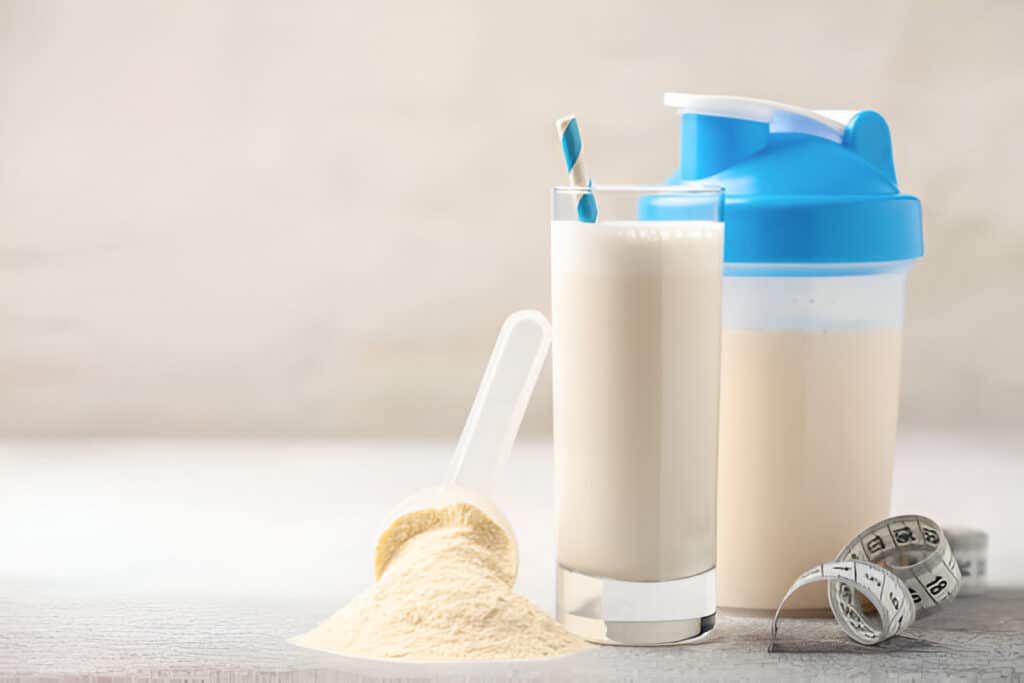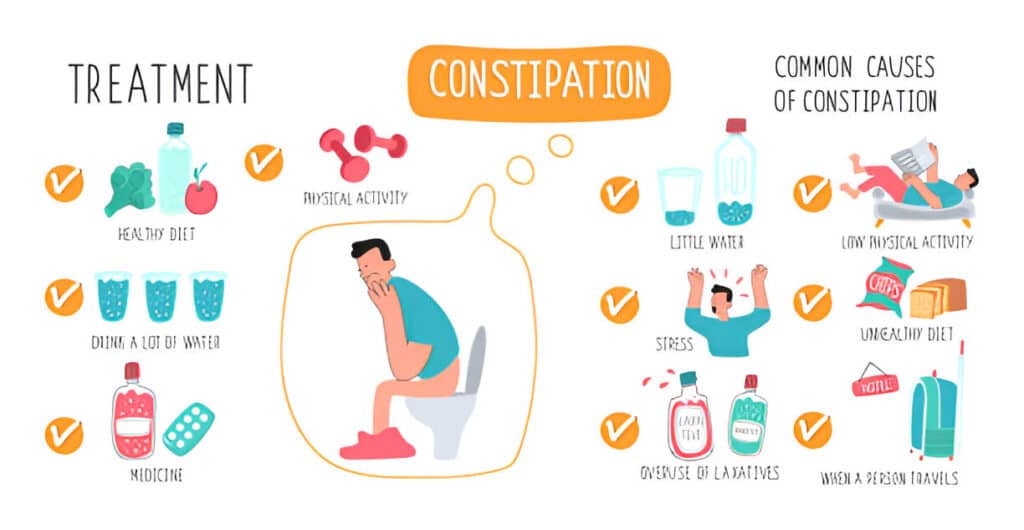Although your digestion has been off lately, you still enjoy your protein shakes. You may find yourself straining harder or notice that your visits to the restroom have decreased in frequency. If you have ever asked, “Do protein shakes cause constipation?” you are not alone. Stomach problems are beginning to surface as a common complaint as protein shakes become the go-to choice for fitness buffs, working professionals, and those trying to lose weight or build muscle.
We will explore in this post why protein shakes are so popular, what constipation means, does too much protein cause constipation, and what other elements might be involved. By the end, you will have helpful advice to keep your gut content and yet enjoy your preferred shake. Let us now get going!
Why are protein shakes so popular, and what are they?

A protein shake is, at its most, simply a drink created by combining a protein powder with milk, water, or a milk substitute. Usually coming from sources like these powders:
- Whey protein, obtained from milk,
- casein protein, derived from milk as well
- Plant-based proteins include soy, hemp, rice, peas, or combinations.
- Protein of eggs
You can purchase powder tubs to mix at home or obtain them in a pre-mixed bottle. While some shakes are unflavored, allowing you to incorporate them into smoothies, oatmeal, or baked products, others are flavored such as chocolate, vanilla, or strawberry.
Why are protein shakes so much in high demand ?
Easily available protein source
Many people find it challenging to achieve daily protein requirements just from whole foods especially if they travel. Without preparing chicken, fish, beans, or eggs every time, protein drinks offer an easy and quick way to get premium protein.
Muscle Development & Rehabilitation
Your muscles need amino acids the building blocks of protein to heal and expand following a demanding workout. Particularly whey, a fast-digesting protein shake, can help supply those amino acids quickly, thereby promoting recovery.
Balance of Weight
Correct use of protein drinks can help reduce appetite. Sipping a shake between meals or using it as a meal replacement (with extra fiber and healthy fats) can help reduce overeating, as protein is generally more satiating than carbohydrates or fats.
Versatility
Protein powder can be stirred into yogurt, smoothies, and even pancake batter. Some people substitute a shake for a meal; others add a scoop to increase the protein content of a recipe. Protein shakes appeal for a variety of purposes muscle growth, weight loss, or addressing nutrient gaps because of their adaptability.
Understanding Constipation
What Is Constipation?
Constipation generally refers to:
- Fewer than three times a week is often considered the standard for infrequent bowel motions.
- Strain, hard pellets, inadequate evacuation difficulty passing stools
- Less stool volume or a sensation of rectal obstruction
Everybody’s “normal” can vary; some find three bowel motions a day typical, while others find three a week acceptable. On the other hand, you should pay some attention to your digestive system if you start feeling uneasy, bloated, or in pain.
Common Reasons for Constipation

Small Fiber Consumption
Fiber helps feces pass more readily and gives them weight. Diets heavy in vegetables, fruits, whole grains, and legumes can produce firmer, more difficult-to-push-out stools.
Not Enough Water
Stools get softer in water. When you underhydrate, the colon absorbs more water from waste, causing the stools to dry and harden.
Inactivity Lifestyle
Regular movement walking, jogging, yoga stokes digestive activity. Extended periods of sitting can cause slowed-down digestion.
Certain drugs or supplements
Certain antacids or anti-nausea drugs, some medicines (including opioids), and iron supplements can reduce intestinal motility.
Food Sensitivities:
Some people have poor lactose (in dairy) digestion, which causes constipation, gas, or bloating. Found in sugar-free protein bars or shakes, sugar alcohols such as sorbitol, xylitol, or maltitol may cause others to respond similarly.
Medical Conditions
Bowel habits can be impacted by illnesses, including irritable bowel syndrome (IBS), thyroid problems, or neurological conditions.
Connecting Protein Shakes to Constipation
How Protein Shakes Might Indirectly Produced Constipation
1. Low Content of Fiber
Many protein powders, particularly whey isolates or concentrates, include either very little or no fiber. You might drastically cut your daily fiber consumption if you replace a whole-food snack or meal say, a sandwich with vegetables with a protein shake consisting simply of protein plus water. A lack of fiber over time can cause slower transit time and harder feces, which can make one feel constipated.
2. Bad Water Content
Including more protein in your diet places a greater burden on the kidneys. Your kidneys eliminate nitrogen waste products (urea) generated by the breakdown of protein through urine. You risk dehydration if you don’t adjust your water consumption. Dehydration adds to tough-to-pass, dry, firm stools.
3. Some Protein Powders’ Ingredients
- If you are lactose intolerant (or slightly sensitive), whey concentrate which can include up to 5–10% lactose may cause bloating, gas, or changes in bowel habits sometimes constipation rather than diarrhea.
- Some mass-gainer or inexpensive powders contain gums (such as xanthan gum or carrageenan), maltodextrin, or other fillers. These can slow down gastric emptying and occasionally produce a thicker shake that settles in your stomach, which causes you to feel lethargic and change bowel motions.
- Low-carb or “zero sugar” powders often contain artificial sweeteners, including sucralose, saccharin, or sugar alcohols (sorbitol, mannitol). Although they usually lead to diarrhea in significant quantities, they can also produce constipation in those who are sensitive particularly if gut flora is knocked off balance.
Do Protein Shakes Cause Constipation? Combining It All
Do protein shakes cause constipation? The quick response is they can, generally indirectly. It’s not the protein itself that’s causing you trouble; instead, it’s how well protein shakes fit your general diet and way of life. Constipation becomes even more likely if you replace low-fiber foods with a low-fiber shake, fail to drink extra water, or choose a powder filled with thickeners and sugar alcohols.
Other Reasons for Constipation Linked with Protein Shakes
Although protein shakes by themselves are not the main offenders, these are the main things to be on the lookout for:
1. Reduced Water from Higher Protein Consumption
- The reason it occurs is that when protein breaks down, amino acids become urea, which your kidneys eliminate. Water is consumed in that process. You run the danger of dehydration if you add one or two protein shakes a day and do not boost your water intake by at least 16–32 ounces (500–1,000 ml) per extra serving.
- Dark yellow pee, dry mouth, tiredness, and less thirst should all be watched for. All this indicates that you should increase your fluid intake.
2. Limited Dietary Fiber
- Why It Happens: Many people substitute a protein shake for meals or snacks like a turkey sandwich or oatmeal topped with berries. A whole-food meal typically has 6–10 g (or more) of fiber; a shake often includes at most 1–3 g (unless it is a “fiber-enriched” powder).
- Low fiber, therefore, slows down transit time and produces hard, dry stools.
3. Ingredients’ Sensitivities or Intolerances
- In milder circumstances, whey concentrate could cause constipation or bloating instead of diarrhea.
- Artificial sweeteners and sugar alcohols can upset gut bacteria, leading to constipation or loose stools as your body tries to adjust.
- Milk/Dairy Allergies: Although they are more commonly associated with diarrhea, an allergy can rarely cause a decrease in intestinal motility.
If you rely primarily on shakes for most meals, you may be deprived of whole-food nutrients like magnesium from leafy greens that encourage good bowel movements.
Lack of Chewing: Some research suggests that mechanical chewing action triggers stomach motility and digestive enzyme activation. A shake is easy to drink, but you lose that signal to your digestive system.
Advice for Avoiding Constipation from Protein Shakes
The good news is that you won’t have to give up shakes. A few simple adjustments can help you maintain normal digestion.
1. Get More Water
- Aim for a minimum of 8–10 cups of water a day; if you add a protein shake, consider adding at least an extra 1–2 cups (250–500 ml) of water.
- Check urine color; the optimum is pale yellow. Darker colors suggest you need more fluids.
- Add watery foods, including strawberries, cucumbers, celery, and watermelon bonus fiber, too!
2. Increase Your Consumption of Fiber
Some brands include 5–10 g of fiber per serving often from sources like inulin, psyllium, or oat fiber into their Fiber-Enriched Protein Powders.
To your smoothie, include half a banana, a bunch of kale or spinach, a tablespoon of chia or flax seeds, or a quarter-cup of oats in Whole Foods.
Snack smart by balancing shakes with whole-grain crackers, carrot sticks, and hummus, or an apple with nut butter.
3. Select the Right Protein Powder
- If you are lactose-sensitive, whey isolates or hydrolysates will have less lactose than concentrates (usually under 1 gram per serving). Further breakdown of whey by hydrolysates facilitates digestion.
- For some people, plant-based options include pea, brown rice, hemp, or soy proteins, which may be milder; just be sure the ingredient list consists of any added sugar alcohols or gums.
- Look for powders with few ingredients protein source, natural flavoring, and perhaps a sweetener like stevia or monk fruit (in moderation). Avoid needless fillers.
4. Mind synthetic fillers and sweeteners.
- Steer clear of powders labeled “maltodextrin,” “cellulose gum,” “sucralose,” or excessive concentrations of sugar alcohols like xylitol or sorbitol.
- Experiment and rotate; if one powder causes stomach problems, try another brand or type (whey → plant, concentrate → isolate). Track meals for a week to find trends in your diet.
5. maintain a balanced diet.
- Do not rely solely on shakes. Aim to receive protein from whole foods, such as eggs, chicken, fish, beans, lentils, yogurt, and almonds. Then, utilize shakes to fill in gaps, not to replace meals entirely.
- Eat healthy fats, such as avocado, olive oil, nuts, and seeds, which lubricate the digestive tract. Including flax oil or almond butter in your shake will help with bowel movement.
6. Regular Exercise
- Keep Moving: Digestion can be stimulated even by a 20 to 30-minute stroll following meals. Gentle twists or yoga poses like “wind-relieving pose” (Pawanmuktasana) help increase intestinal motility.
- Building muscle and raising your heart rate at least three to four times a week helps maintain general intestinal health through a combination of strength training and cardio.
7. Probiotics and digestive enzymes
- Yogurt containing live cultures, such as kefir, sauerkraut, kimchi, or kombucha, can help maintain gut flora in balance.
- Broad-spectrum digestive enzymes may be worth trying if you believe you’re not breaking down specific proteins or lactose effectively; however, be sure to first consult with a healthcare provider.
When Should One See a Doctor?
Generally speaking, most Infrequent constipation is not cause for concern. If you have, however, experienced any issues, you should see a healthcare provider.
- Sharp or continuous pain paired with constipation could point to a blockage or other major problem in the abdomen.
- Bright red blood or black tarry stools should be seen soon away by a doctor.
- Unintentional Weight Loss: When combined with intestinal problems, unintentional weight loss can indicate an underlying illness.
- Constipation Lasting Over Three Weeks: Particularly in cases when lifestyle changes (fiber, water, exercise) prove ineffective.
- Combined with constipation, nausea, vomiting, or bloating can indicate a blockage or motility issue.
- History of GI Disease: Regular constipation may indicate you need medication changes if you have IBS, Crohn’s disease, ulcerative colitis, or another digestive condition.
- To rule out major disorders, your doctor can suggest blood testing, stool analysis, imaging (such as a CT scan or abdominal X-ray), or a colonoscopy. They might also advise a referral to a gastroenterologist or propose prescription drugs like osmotic laxatives or stool softeners.
Final Thought
Whether your goal is weight loss, muscle development, or simply addressing dietary deficiencies, protein shakes are a great and quick way to increase your daily protein intake. However, if you’re not careful, certain elements related to protein shakes low fiber content, poor hydration, and substances like dairy, sweets, or thickeners can cause constipation.
The following is a brief review:
- Know Why: Shakes more importantly fit your general diet and way of life than the protein itself.
- To enable your kidneys to clear waste and maintain soft stools, up your water consumption.
- Give fiber priority; mix in fruits or vegetables, and then incorporate whole-food sources throughout the day. Use fiber-rich powders.
- If you are sensitive, opt for low-lactose or plant-based powders and avoid unnecessary additives.
- Eat a balanced diet; avoid letting smoothies replace every meal; get protein from a variety of sources.
- One of the most effective ways to keep everything moving naturally is to exercise regularly.
Whether you’re drinking your protein shakes as part of a meal plan, a midday pick-me-up, or post-workout, these guidelines will help you enjoy them without sacrificing intestinal health. See a doctor if you still experience constipation despite these modifications. Your digestive system will appreciate you!
All set to delve deeper into nutrition optimization? To keep you comfortable and motivated on your fitness path, review our other pieces on gut-friendly juices, and high protein fast foods ideas.




Pingback: Can You Take Creatine Before Bed? Benefits & Best Time